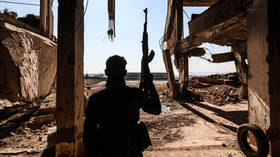India-Russia friendship is too pragmatic for US and China to ruin it
Upon his return from India this week, Russian Foreign Minister Sergey Lavrov has said he feels no wavering on New Delhi’s end of its defense cooperation with Moscow, despite American pressure on anyone doing business with Russia.
The 19th century British statesman Lord Palmerston famously said “we have no eternal allies, and we have no perpetual enemies. Our interests are eternal and perpetual.” This maxim has been used to justify flexibility for a country to choose and discard partners, depending on the changing times and circumstances.
Whether in defiance, or in support of this very pragmatic logic, one major relationship has persisted. India and Russia have sustained a robust partnership through the Cold War, the post-Cold War era, and now in the emerging multipolar order. The international system as a whole has changed beyond comprehension in the last fifty years, but what New Delhi and Moscow call ‘Druzhba-Dosti’ (friendship in Russian and Hindi) has remained intact.
India’s External Affairs Minister Subrahmanyam Jaishankar referred to this while hosting his Russian counterpart Sergey Lavrov on April 7 by remarking that India and Russia have shown a “consistent ability to identify and update our shared interests.”
In spite of the US
While there is a perception of divergence between the two sides due to their respective global strategic compulsions, India needs Russia and vice-versa and the ‘special and privileged strategic partnership’ is not fading away. Defense cooperation is an obvious illustration of that. Lavrov’s comment in New Delhi that ‘prospects for additional production of Russian military equipment on India’s territory are under discussion’ caught attention in India because of the threat of American sanctions on any country that does ‘significant transactions’ with Russia.
New Delhi insists that the Russian-made S-400 anti-missile system is essential for India’s national security and that imposing sanctions on India for pursuing its core national interests would be a strategic blunder by the US. Russia is a touchstone for India to prove its ‘strategic autonomy’ in foreign policy. Moreover, Russia has been the most generous among the world’s military powers in offering co-production and technology transfer to India for defence manufacturing. Lavrov’s emphasis that ‘we are the only partner that indeed transfers to India cutting-edge military technology’ and that this is in ‘the national interests of both countries,’ conveys that the two sides are determined to plough ahead.
President Vladimir Putin’s commitment to enhancing India’s indigenous defence production capacities matches with Prime Minister Narendra Modi’s vision of making India an exporter of ‘low-cost, high-quality’ weapons. Russia is keen to retain its share of the Indian defence market, which has historically been massive but lately has fallen to 49% of total Indian military imports. If Russia’s competition for a share of the Indian defence pie with France (18%), Israel (13%) and the US spurs more advanced co-development of weapons with India, it serves both New Delhi and Moscow.
Between China and India
Skeptics who contend that India and Russia are strategically drifting apart because of the former’s closeness to the US, the latter’s alignment with China, and intensifying tensions between India and China, should look at how Russia promptly supplied much-needed defence equipment to India in 2020 as New Delhi was engaged in a major national security crisis along its northern border. Jaishankar acknowledged in Lavrov’s presence that "our defence requirement in the past year was expeditiously addressed" by Russia.
Lavrov’s statement that "we are closely watching the process of normalisation at the Line of Actual Control (LAC)" between China and India was not unwelcome from an Indian point of view. Moscow’s good offices have been creatively used both in the 2017 Doklam standoff and during the LAC dispute that began in 2020. India and Russia serve as each other’s balancing factors that bring stability in relations with China.
Unlike the crude offers to ‘mediate’ or ‘arbitrate’ between China and India that the US made under President Donald Trump, Putin’s Russia has a proven record as a pragmatic interlocutor. Lavrov has assured New Delhi that "Russia has no plans to sign a military alliance with China", and Russia has been willing to hear out India’s geopolitical perspectives and dilemmas despite having a joint front with China in standing up to the West. The same open-mindedness has led to exploration of new avenues such as Japan-India-Russia trilateral economic cooperation in Russia’s Far East and India manufacturing Russia’s Sputnik V vaccines for combating the Covid-19 pandemic.
Sticking points
One issue where differences have crept in between India and Russia is Afghanistan. Some in India have expressed worries of a ‘Russia-China-Pakistan axis’ emerging in South-Central Asia whose practical effect could be to sideline India from the settlement of Afghanistan’s future. Lavrov’s recent discussions with Jaishankar on Afghanistan, the former’s reiteration that India was very much a part of the ‘Moscow format’ for stabilising Afghanistan and an ‘important player in the settlement in Afghanistan’, should calm nerves in New Delhi.
Russia’s defence sales to Pakistan are much smaller in volume and scope than the India-Russia security cooperation, and in themselves are not major irritants. What is required in order to reduce disagreements on this front is for Russia and India to coordinate better on their commonly stated goal of an ‘Afghan-led, Afghan-owned peace process.’
Iran is another regional issue where India and Russia are looking more aligned now. The restart of talks involving the Europeans, Russia, China, the US and Iran to revive the 2015 nuclear agreement has India’s wholehearted backing. New Delhi’s investments and plans to integrate with Iran, Afghanistan and Central Asia via Iran’s Chabahar port were stuck in limbo as long as Washington applied ‘maximum pressure’ sanctions on Tehran. India’s push to get Chabahar included in the agenda of the 13-nation International North South Transport Corridor (INSTC) could connect Russia, Iran, India and Central Asia closer and help usher in balance in the Eurasian region.
In this context, it can be a good sign that Lavrov personally met the Joe Biden administration’s climate envoy and former US Secretary of State John Kerry, who had played a crucial role in the US-Iran thaw of 2015, while both happened to be in New Delhi.
With a lot still in common between India and Russia, the global dichotomies of Sino-US confrontation and Russia-US frostiness need not be insurmountable hurdles. In the current fluid multipolar world, there are no watertight or exclusive alliances. Countries have to forge one set of friends on one issue and another set on a second issue. India and Russia are mature enough to understand this dynamic.
The statements, views and opinions expressed in this column are solely those of the author and do not necessarily represent those of RT.














